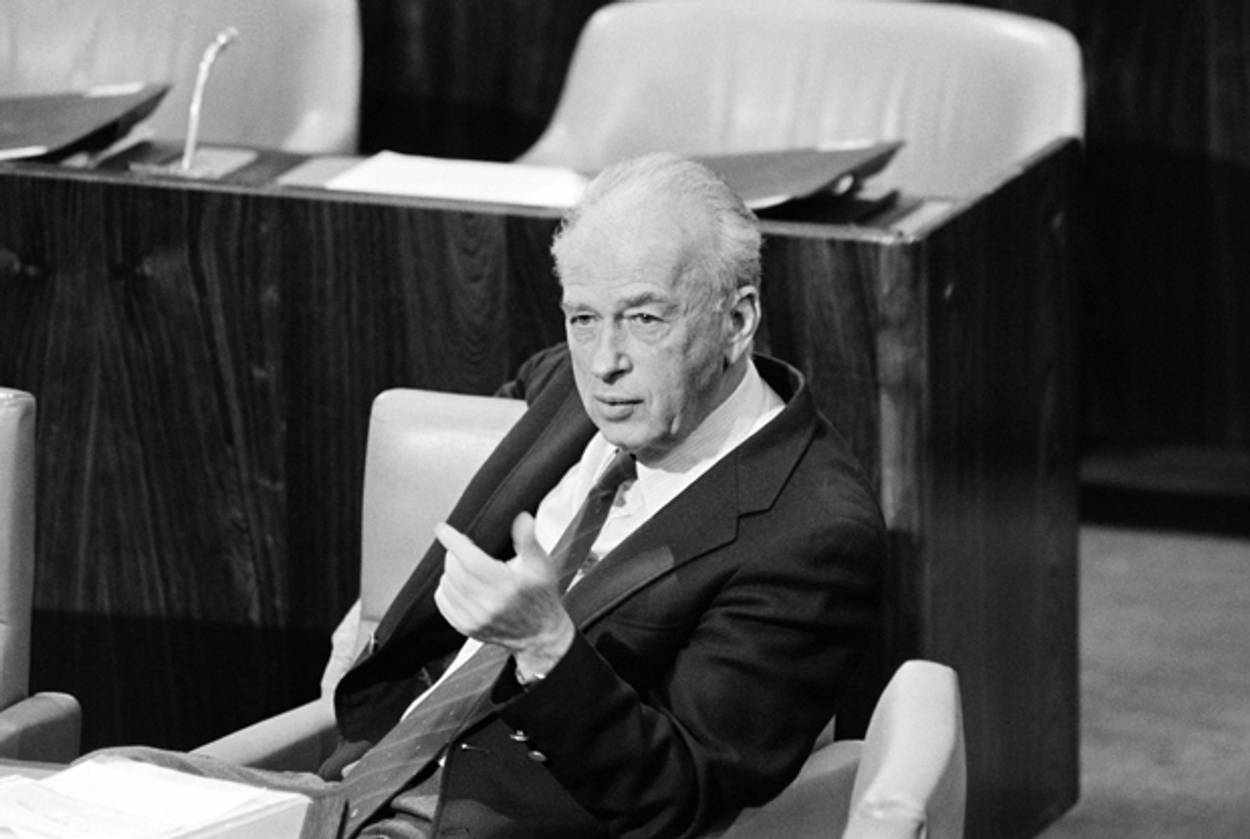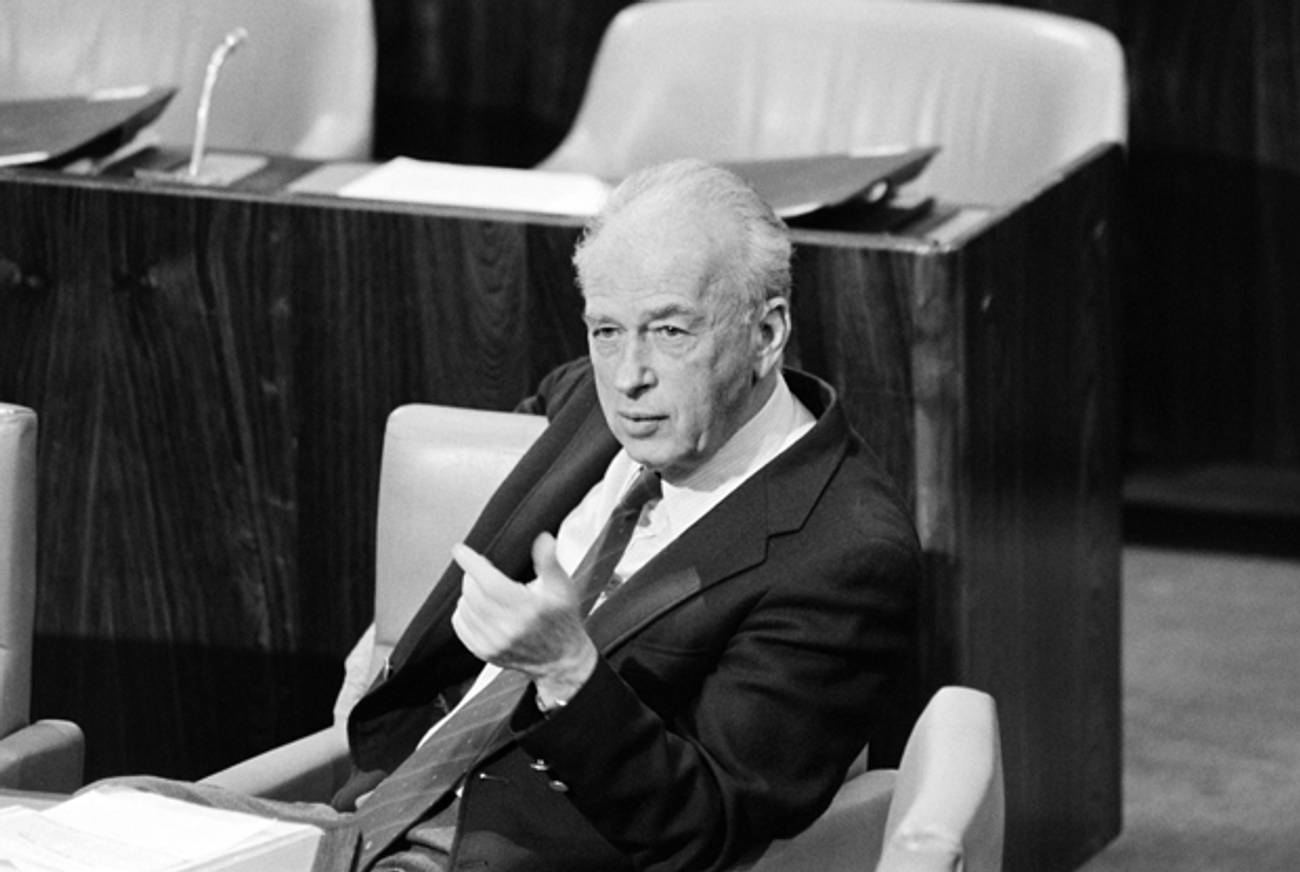Misremembering Yitzhak Rabin
The paragon of peace held positions nearly identical to Netanyahu




Nineteen years ago today, on November 4, 1995, Israeli Prime Minister Yitzhak Rabin was assassinated by a far-right extremist. In a yearly ritual, he is being remembered as a peacemaker and as someone whose death “changed history.” Rabin, it is widely said, could have ended the Israeli-Palestinian conflict, something the Anti-Defamation League vividly portrayed in its alternate history viral video, “Imagine a World Without Hate.”
But if you read Rabin’s final speech to the Israeli parliament, delivered just a month before he died, the picture seems more complicated than this narrative. On October 5, 1995, Rabin laid out his vision for peace, telling the Knesset (italics ours):
We view the permanent solution in the framework of State of Israel which will include most of the area of the Land of Israel as it was under the rule of the British Mandate, and alongside it a Palestinian entity which will be a home to most of the Palestinian residents living in the Gaza Strip and the West Bank.
We would like this to be an entity which is less than a state, and which will independently run the lives of the Palestinians under its authority. The borders of the State of Israel, during the permanent solution, will be beyond the lines which existed before the Six Day War. We will not return to the 4 June 1967 lines.
And these are the main changes, not all of them, which we envision and want in the permanent solution:
A. First and foremost, united Jerusalem, which will include both Ma’ale Adumim and Givat Ze’ev — as the capital of Israel, under Israeli sovereignty, while preserving the rights of the members of the other faiths, Christianity and Islam, to freedom of access and freedom of worship in their holy places, according to the customs of their faiths.
B. The security border of the State of Israel will be located in the Jordan Valley, in the broadest meaning of that term.
C. Changes which will include the addition of Gush Etzion, Efrat, Beitar and other communities, most of which are in the area east of what was the “Green Line,” prior to the Six Day War.
D. The establishment of blocs of settlements in Judea and Samaria, like the one in Gush Katif.
It’s an address that could have been given by Benjamin Netanyahu, who has pointedly opposed withdrawal to the 1967 borders—most famously alongside President Obama in the Oval Office—and insisted upon a long-term Israeli security presence in the Jordan Valley and a united Jerusalem. Far more generous peace offers than Rabin’s, which included the division of Jerusalem, were made by his left-wing successors as prime minister, Ehud Barak and Ehud Olmert. Meanwhile, Gush Katif, one of the settlements singled out by Rabin for preservation, was evacuated by right-wing prime minister Ariel Sharon—along with the rest of Israel’s settlements in Gaza.
If anyone can be said to be carrying on Rabin’s legacy, it is Netanyahu, who, like Rabin in 1995, is more skeptical of the stability and good intentions of a potential Palestinian neighbor, and insists on more defensible borders and stronger security guarantees in any peace deal. But even Netanyahu has been willing to grant the Palestinians a state—rather than Rabin’s “entity which is less than a state”—telling CNN’s Fareed Zakaria just last month that “I remain committed to a vision of peace, of two states for two peoples, two nation-states, one for the Palestinian people, one for the Jewish people.”
And unlike Rabin, the Likud leader froze West Bank settlements for 10 months to jumpstart negotiations, and initiated a “silent freeze” on building in Israel’s contentious capital of Jerusalem. Even Netanyahu, in other words, has governed—both in word and deed—from Rabin’s left. Needless to say, this is not so much a reflection of Bibi’s dovishness as Rabin’s hawkishness.
But if Rabin didn’t actually possess the most prophetic positions on peace, what then is his true legacy? To answer this question, it helps to look at what it is not. In a series of tweets today, Canadian scholar Jeet Heer claimed that “[Yigal] Amir’s bullets achieved what the right wanted: a definitive end to the last real chance for a 2-state solution.” Added Heer, “Rabin came as close to a final agreement as any Israeli leader ever has, and since his murder there’s been flight from negotiation.”
But as one can see from the history of Israeli peace offers after Rabin, this is decidedly not so. In fact, as those offers demonstrate, the impact of Rabin’s murder was quite the opposite. His assassination presaged a massive shift in Israeli public opinion toward peace and the two-state solution. Following Rabin’s shooting, the Israeli left moved to his left, while the Israeli right gradually adopted Rabin’s own positions from when he led the Israeli left. (Recent Israeli skepticism about the peace process has far more to do with Gaza’s rockets than Amir’s bullets.) As Ben Birnbaum, the journalist who co-wrote the definitive account of the most recent peace talks for The New Republic, has put it, “The untold story of the peace process is the fact that by any objective measure, Benjamin Netanyahu today is to the left of where Yitzhak Rabin was in the 90s.”
This is what Rabin achieved. He might not have been the revolutionary peacemaker that some of today’s hagiography makes him out to be. Few elected leaders in modern democracies can be so far ahead of their time and people within the constraints of politics and history. But what Rabin did accomplish was creating the space for Israelis to recognize the need for Palestinian autonomy. By daring to imagine a different future, and taking the first courageous steps towards it, he set in motion the trends that would ultimately remake Israeli society, and open the door for leaders like Barak, Olmert, and yes, Netanyahu, to take positions far beyond what he initially envisioned.
Previous: How Not To Remember Rabin
Related: Grim Anniversary
Falling Out
Yair Rosenberg is a senior writer at Tablet. Subscribe to his newsletter, listen to his music, and follow him on Twitter and Facebook.